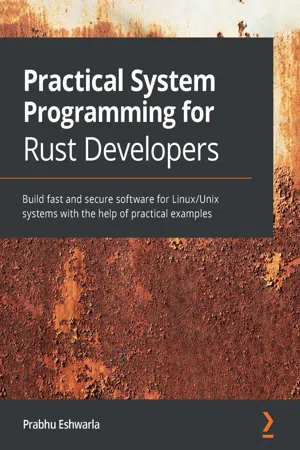
Practical System Programming for Rust Developers
Build fast and secure software for Linux/Unix systems with the help of practical examples
- 388 pages
- English
- ePUB (mobile friendly)
- Available on iOS & Android
Practical System Programming for Rust Developers
Build fast and secure software for Linux/Unix systems with the help of practical examples
About this book
Explore various Rust features, data structures, libraries, and toolchain to build modern systems software with the help of hands-on examples
Key Features
- Learn techniques to design and build system tools and utilities in Rust
- Explore the different features of the Rust standard library for interacting with operating systems
- Gain an in-depth understanding of the Rust programming language by writing low-level software
Book Description
Modern programming languages such as Python, JavaScript, and Java have become increasingly accepted for application-level programming, but for systems programming, C and C++ are predominantly used due to the need for low-level control of system resources. Rust promises the best of both worlds: the type safety of Java, and the speed and expressiveness of C++, while also including memory safety without a garbage collector. This book is a comprehensive introduction if you're new to Rust and systems programming and are looking to build reliable and efficient systems software without C or C++.
The book takes a unique approach by starting each topic with Linux kernel concepts and APIs relevant to that topic. You'll also explore how system resources can be controlled from Rust. As you progress, you'll delve into advanced topics. You'll cover network programming, focusing on aspects such as working with low-level network primitives and protocols in Rust, before going on to learn how to use and compile Rust with WebAssembly. Later chapters will take you through practical code examples and projects to help you build on your knowledge.
By the end of this Rust programming book, you will be equipped with practical skills to write systems software tools, libraries, and utilities in Rust.
What you will learn
- Gain a solid understanding of how system resources are managed
- Use Rust confidently to control and operate a Linux or Unix system
- Understand how to write a host of practical systems software tools and utilities
- Delve into memory management with the memory layout of Rust programs
- Discover the capabilities and features of the Rust Standard Library
- Explore external crates to improve productivity for future Rust programming projects
Who this book is for
This book is for developers with basic knowledge of Rust but little to no knowledge or experience of systems programming. System programmers who want to consider Rust as an alternative to C or C++ will also find this book useful.
Tools to learn more effectively

Saving Books

Keyword Search

Annotating Text

Listen to it instead
Information
Section 1: Getting Started with System Programming in Rust
- Chapter 1, Tools of the Trade – Rust Toolchains and Project Structures
- Chapter 2, A Tour of the Rust Programming Language
- Chapter 3, Introduction to the Rust Standard Library
- Chapter 4, Managing the Environment, Command Line, and Time
Chapter 1: Tools of the Trade – Rust Toolchains and Project Structures
- Choosing the right configuration of Rust for your project
- Cargo introduction and project structure
- Cargo build management
- Cargo dependencies
- Writing test scripts and doing automated unit and integration testing
- Automating the generation of technical documentation
Technical requirements
Choosing the right Rust configuration for your project
Choosing a Rust release channel
Table of contents
- Practical System Programming for Rust Developers
- Why subscribe?
- Preface
- Section 1: Getting Started with System Programming in Rust
- Chapter 1: Tools of the Trade – Rust Toolchains and Project Structures
- Chapter 2: A Tour of the Rust Programming Language
- Chapter 3: Introduction to the Rust Standard Library
- Chapter 4: Managing Environment, Command Line, and Time
- Section 2: Managing and Controlling System Resources in Rust
- Chapter 5: Memory Management in Rust
- Chapter 6: Working with Files and Directories in Rust
- Chapter 7: Implementing Terminal I/O in Rust
- Chapter 8: Working with Processes and Signals
- Chapter 9: Managing Concurrency
- Section 3: Advanced Topics
- Chapter 10: Working with Device I/O
- Chapter 11: Learning Network Programming
- Chapter 12: Writing Unsafe Rust and FFI
- Other Books You May Enjoy
Frequently asked questions
- Essential is ideal for learners and professionals who enjoy exploring a wide range of subjects. Access the Essential Library with 800,000+ trusted titles and best-sellers across business, personal growth, and the humanities. Includes unlimited reading time and Standard Read Aloud voice.
- Complete: Perfect for advanced learners and researchers needing full, unrestricted access. Unlock 1.4M+ books across hundreds of subjects, including academic and specialized titles. The Complete Plan also includes advanced features like Premium Read Aloud and Research Assistant.
Please note we cannot support devices running on iOS 13 and Android 7 or earlier. Learn more about using the app